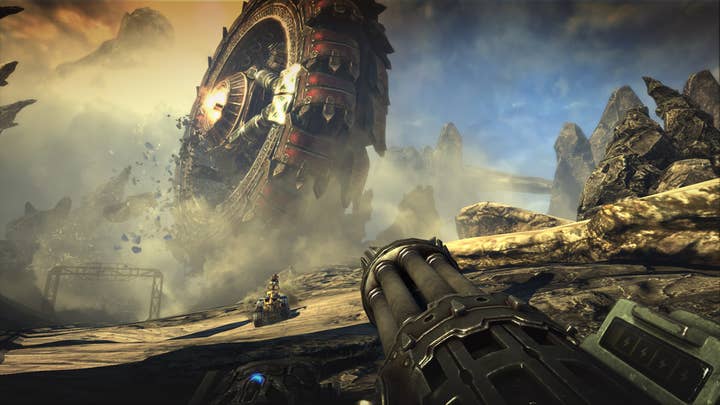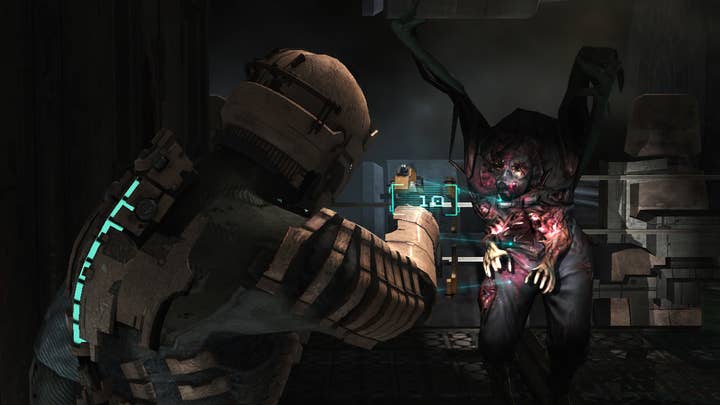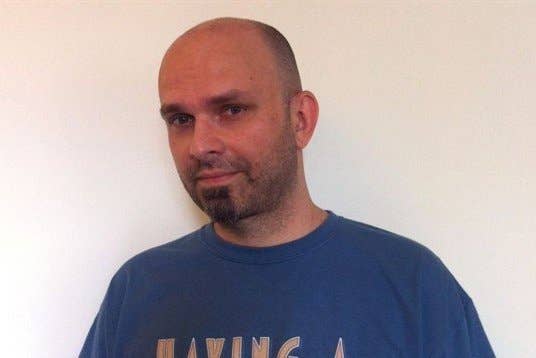The Astronauts: "In 2014, $60 for a game is a little insane"
Creative director Adrian Chmielarz on the lessons of Bulletstorm and the problem with price-points
People Can Fly's Bulletstorm was one of the great 'What If?'s of the last console generation: a brash, knowing, and consistently inventive shooter, full of personality and playful attitude at a time when so much of that genre was mired in the dust-caked hotspots of the Middle East. With the full backing of Epic Games, and Electronic Arts on publishing duties, Bulletstorm had 'breakout hit' etched onto every one of its colour-saturated pixels.
Adrian Chmielarz remembers it well. As creative director of People Can Fly, the launch of Bulletstorm was the culmination of an earnest effort to breathe something approaching life into a staid genre, and by doing so earn a seat at the AAA table. That process had started with the founding of the studio in 2002, had taken its first step with the unabashed and under-appreciated Painkiller in 2004, and after nearly a decade of work the decisive moment was finally at hand.
In early 2011, a few weeks before launch, Chmielarz received a call. The industry's motley crew of analysts had released their sales expectations for Bulletstorm: the optimists said 4 million, the pessimists went as low as 3 million.
Chmierlaz cracks a rueful smile. "Oh boy, oh boy - I would wish for those numbers."

To be clear, Bulletstorm did not sell, as Chmielarz puts it, "tragically," but based on its buoyant critical reception it fell far short of its commercial potential. In the immediate aftermath Chmielarz saw EA's marketing as the culprit, reducing People Can Fly's clutch of fresh ideas to dick-jokes for dude-bros. "Things that were, in my opinion, like spices in the game became its main ingredient in the marketing," he says.
Three years on, however, he is able to see the bigger picture. That Bulletstorm's mishandled marketing still grates on Chmielarz is plain to see, but he now understands that there were forces at play in the industry that were beyond the control of even the biggest publishers, let alone a studio like People Can Fly.
"If you want to sell a game for $60, to the player it has to feel like $200"
"Everybody is smart in retrospect," he admits, "and looking back I do think that we were possibly among the first victims of this giant shift in gaming, where the middle-class AAA games began to die - not 'middle-class' by quality, but we didn't have ten multiplayer modes and co-op and all of that. The saying in the industry right now is, 'If you want to sell a game for $60, to the player it has to feel like $200.'
"Bulletstorm was a $60 game for $60. And these days $60 for a game sounds basically crazy, when there are literally hundreds of high quality games out there for a much smaller price - even on console. In 2014, $60 for a game is a little insane."
Chmielarz left People Can Fly in August 2012, just after Epic Games acquired the company. His new studio, The Astronauts, is in full development on its enigmatic debut project, The Vanishing of Ethan Carter, and it's clear that the company's creative and commercial direction is informed by Chmielarz's experiences in the rarefied world of mega-publishers and blockbuster launches.

"Look at Dead Space," he says. "I'm a big fan of Dead Space, I've read all of the books and comics and everything. But for some reason, instead of keeping expectations at 2 or 3 million copies sold and setting an appropriate budget for that, EA wanted it to be another Call of Duty - unless it sells 5 million it's dead. That could be a profitable series, but only if you're smart about the budget and the content."
And Chmielarz believes that this need to turn every successful IP into an cross-platform, transmedia behemoth is leaving money on the table. He understands the value of huge annualised franchises like Assassin's Creed, but in chasing that ideal the industry's biggest and most influential publishers have lost sight of how to create and maintain a mid-sized hit. I mention Paramount Pictures' Paranormal Activity series, which has now produced five films, all of them huge hits with massive audiences, all of them made for a similarly small budget. It displays a more nuanced understanding of the relationship between investment and return than most AAA game companies seem to possess.
"Lower prices would allow us to stop thinking about filler, and start focusing on making the experience just right"
"It's interesting that you mention that, because I researched the same thing and I agree with you 100 per cent," he says. "They [the film studios] don't try to turn every successful horror film into Raiders of the Lost Ark, or that level of popularity. They're very conscious about the budget, and the amount of money they make on Insidious, or The Conjuring, or Mama, it's very profitable for them. It's not amateurish and made by people who don't know what they're doing. They're just focused and they're smart and they're thriving. That's what needed to happen with Dead Space."
Chmielarz is quick to dismiss the notion that he has turned against the idea of AAA games, or that there is no creativity evident in the top tier of the industry. He throws up Rockstar's Red Dead Redemption as an example of just how innovative and immersive a blockbuster game can be, or Naughty Dog's The Last of Us, or even MachineGames' Wolfenstein: The New Order, which he was playing and enjoying until the early hours of the morning before our interview.
The problem with the AAA world is not the games; the problem is the structure of assumptions and arbitrary targets that surrounds them. The AAA industry and its audience are hung up on outdated notions of price, length and perceived value that funnel a wide variety of good ideas towards the same basic set of objectives. It's why otherwise smart and precise experiences like Bioshock Infinite and The Last of Us are brimming with combat set-pieces and multiplayer modes.
Gotta tick those boxes. Gotta justify that $60 price-point. And here's the rub: in a digital world, whether AAA or indie, those restrictions should be irrelevant.
"There is a necessity to add filler in AAA games, whether it be collectibles or one more wave of enemies," Chmielarz says. "It's unfortunate, and it's also proof that the world is insane. Because you have players demanding that games are long, but then you look at the data and see that not even half of those people see even half of the game. There's clearly something wrong there, right? 70 or 80 per cent of people never finish the game. That's insanity, right?
"But I think that's connected to the price, and there we go again. Lower prices would allow us to stop thinking about filler for our games, and start focusing on making the experience just right. You have to live with the fact that some players will complain no matter what, but I think that when your game is tight, and the story you want to tell is told exactly the way you want, I think the effect is way more powerful than anyone complaining that they didn't get 100 hours of entertainment for their €20.
"That's exactly what we're doing with The Vanishing of Ethan Carter."

